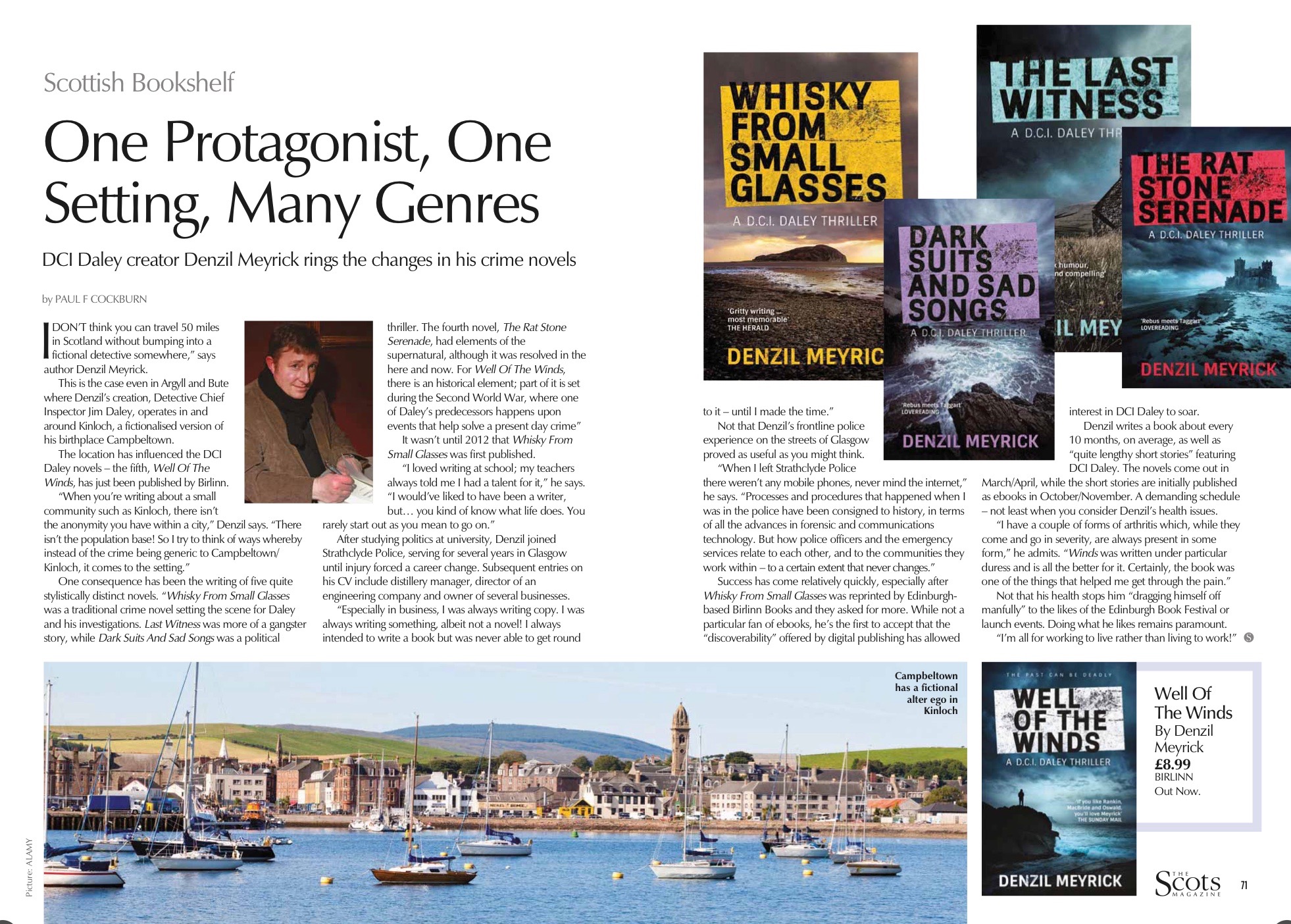
“I don’t think you can travel 50 miles in Scotland without bumping into a fictional detective somewhere,” insists author Denzil Meyrick.
This is the case even in Argyll and Bute where Denzil’s own literary creation, Detective Chief Inspector Jim Daley, operates in and around the small town of Kinloch, a fictionalised Campbeltown.
 This particular location has influenced the DCI Daley novels—the fifth, Well of the Winds, is published by Birlinn Books in April. “When you’re writing about a small community such as Kinloch, there isn’t the anonymity that you have within a large city,” Denzil says. “There isn’t the population base! So I try to think of ways whereby, instead of the crime being generic to Campbeltown/Kinloch, it comes to the setting rather than the setting leading it.”
This particular location has influenced the DCI Daley novels—the fifth, Well of the Winds, is published by Birlinn Books in April. “When you’re writing about a small community such as Kinloch, there isn’t the anonymity that you have within a large city,” Denzil says. “There isn’t the population base! So I try to think of ways whereby, instead of the crime being generic to Campbeltown/Kinloch, it comes to the setting rather than the setting leading it.”
One consequence of this has been the writing of five quite stylistically distinct novels. “Whisky from Small Glasses was a traditional crime novel setting the scene for Daley and his investigations. Last Witness was more of a gangster story, while Dark Suits and Sad Songs was a political-thriller. The fourth novel, The Rat Stone Serenade, had elements of the supernatural, although it was resolved in the here and now. For Well of the Winds, there’s an historical element; part of it is set during the Second World War, where one of Daley’s predecessors happens upon events that help solve a crime in the present day.”
The Campbeltown-born author has always been interested in reading and writing, but it wasn’t until 2012 that Whisky from Small Glasses was first published. “I loved writing at school; my teachers always told me I had a talent for it,” he says. “I would’ve liked to have been a writer, but… you kind of know what life does. You rarely start out as you mean to go on.”
After studying politics at university, Denzil joined Strathclyde Police, serving for several years in Glasgow until injury forced a career change. Subsequent entries on his CV include distillery manager, director of a large engineering company and owner of several businesses, including a sales and marketing company. “Especially in business, I was often involved in sales and marketing, so I was always writing copy. I was always writing something, albeit not a novel! I always intended to write a book but was never able to get round to it—until I made the time.”
Not that Denzil’s frontline police experience on the streets of Glasgow proved as useful now as you might think. “When I left Strathclyde Police there weren’t any mobile phones, never mind the internet,” he says. “Processes and procedures that happened when I was in the police have been consigned to history, in terms of all the advances in forensic and communications technology. But how police officers and the emergency services relate to each other, and to the communities they work within—to a certain extent, that never changes.”
Success has come relatively quickly to Denzil, especially after Whisky from Small Glasses was reprinted by Edinburgh-based Birlinn Books and they asked for more. While not a particular fan of ebooks—“I spend my day in front of a screen; I just want to get away from a screen when I’m not working,” Denzil says—he’s also the first to accept that the “discoverability” offered by digital publishing has allowed interest in the DCI Daley novels to soar.
Denzil writes a book about every 10 months, on average, as well as “quite lengthy short stories” featuring DCI Daley—the novels come out in print in March/April, while the short stories are initially published as ebooks in October/November. It’s a remarkably demanding schedule, not least when you consider Denzil’s long-term health issues. “I have a couple of forms of arthritis which, while they come and go in severity, are always present in some form or other,” he admits. “Winds was written under particular duress and is all the better for it, because I managed to wrought these words from myself. Certainly, the book was one of the things that helped me get through the pain because, when you’re writing, you’re totally absorbed in what you’re doing. It kind of takes you out of yourself.”
Not that his health stops him from “dragging himself off manfully” to the likes of the Edinburgh International Book Festival or book launch events around the country. Nevertheless, doing what he likes remains paramount. “I’m all for working to live rather than living to work,” he insists.
First published in The Scots Magazine, #May 2017.